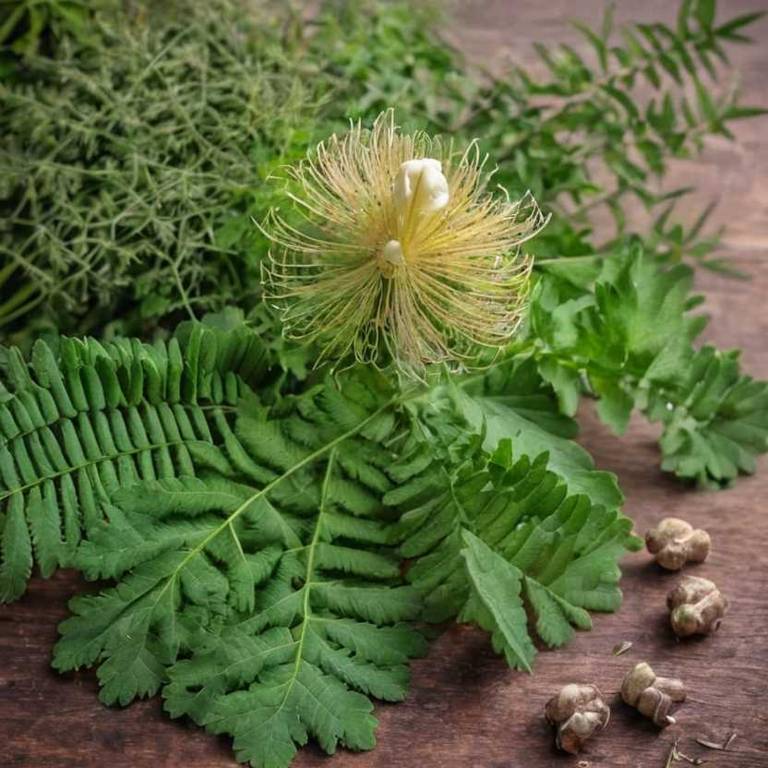Silk Tree (Albizia lebbeck)
Silk Tree (Albizia lebbeck) is a member of the Fabaceae family, native to Southeast Asia, Indian Subcontinent, and South Asia. Traditionally, its leaves, bark, and roots have been used for decoctions, infusions, and powders.
This herb is particularly valued for its sedative, tonic, and anti-inflammatory actions, and has a long history of use in ayurvedic medicine, african traditional medicine, and traditional chinese medicine.

Quick Facts / Key Information
| Common Name | Silk Tree |
|---|---|
| Scientific Name | Albizia lebbeck |
| Plant Family | Fabaceae |
| Genus | Albizia |
| Species | lebbeck |
| Native Range | Southeast Asia, Indian Subcontinent, South Asia |
| Plant Parts Used | Leaves, Bark, Roots |
| Primary Medicinal Actions | Sedative, Tonic, Anti-Inflammatory |
| Primary Traditional Systems | Ayurvedic Medicine, African Traditional Medicine, Traditional Chinese Medicine |
| Historical Preparation Methods | Decoction, Infusion, Powder |
Botanical Identity
- Scientific Name
- Albizia lebbeck
- Common Name
- Silk Tree
- Synonyms / Alternative Names
- Velvetwood, Velvet Tree, Rain Tree
- Plant Family
- Fabaceae
- Genus
- Albizia
Botanical Description
- Growth Habit
- Perennial herbaceous plant.
- Height
- It typically grows to a height of 10 to 20 meters.
- Leaves
- Ovate leaves with a glossy upper surface and a matte lower surface, bearing prominent stomatal bands along the midrib.
- Flowers
- Inflorescences are dense, spherical clusters with white flowers having five petals, each with a prominent yellow claw, and actinomorphic symmetry.
- Stems
- Cylindrical, woody, branched, with opposite phyllotaxis, smooth surface, and persistent stipules.
Traditional Uses / Historical Use
Traditional Systems
- Ayurvedic Medicine
- African Traditional Medicine
- Traditional Chinese Medicine
- European Herbal Medicine
Historical Preparation Methods
- Decoction
- Infusion
- Powder
- Poultice
Medicinal Actions
- Sedative
- In herbal literature, noted as a calming sedative, for relaxation-oriented uses.
- Tonic
- In herbal texts, considered a warming tonic, in whole-system applications.
- Anti-inflammatory
- Commonly referenced as a moderate anti-inflammatory, for irritation-related applications.
- Diuretic
- Historically regarded as a cooling diuretic, in urinary system discussions.
Active Compounds
- Flavonoid
- Plant-based polyphenolic compounds frequently distributed throughout aerial plant parts.
- Tannin
- Naturally occurring polyphenols widely distributed in woody and leafy plant parts.
- Saponin
- Secondary plant compounds composed of sugar-linked aglycones.
- Coumarin
- A class of aromatic organic compounds found in many plant species.
Modern Research Overview
Scientific literature concerning this plant spans multiple areas, including phytochemistry and laboratory research. Detailed analysis of published studies is not included at this time and will be added as part of future editorial expansion.
Safety & Contraindications
- General Precautions
- Caution is advised in certain contexts based on traditional use and available information.
- Contraindications
- Reports outlining specific contraindications for this herb are limited.
- Allergies
- Information regarding allergic responses to this herb is limited.
- Drug Interactions
- The potential for interactions with prescription medications has not been extensively studied.
- Toxicity
- There is insufficient evidence to determine the toxic potential of this herb.
- Pregnancy & Breastfeeding
- Use during pregnancy or breastfeeding has not been clearly established in available sources.
Preparation & Usage Methods
- Infusion
- Dried or fresh plant parts are infused in hot water and consumed as a beverage.
- Decoction
- This method uses sustained heat to extract compounds from firm plant structures.
- Poultice
- This method uses direct contact between plant material and the skin.
- Powder
- This method converts dried plant material into a uniform powder.
- Extract
- A preparation involving the separation of plant constituents without alcohol.
Growing, Harvesting & Storage
Growing / Cultivation
- Soil
- Prefers loamy soil with well-drained conditions. Typically grows best in nutrient-rich soils.
- Sunlight
- Thrives in full sun. Tolerates full sun to partial shade.
- Watering
- Prefers well-balanced moisture levels. Tolerates periodic dry conditions.
Medical Disclaimer
The information provided on this page is for educational and informational purposes only. It is not intended to diagnose, treat, cure, or prevent any medical condition. Always consult a qualified healthcare professional before using any herb for medicinal purposes.